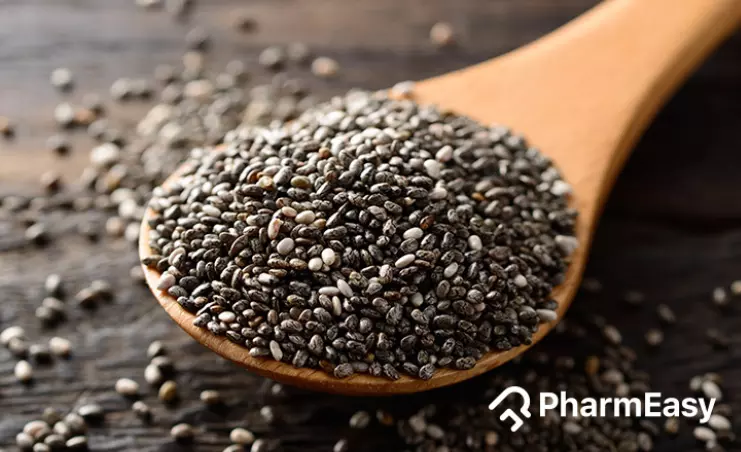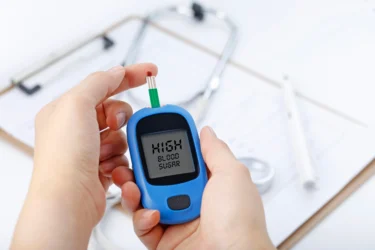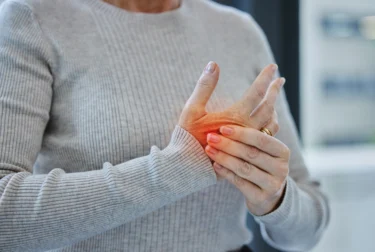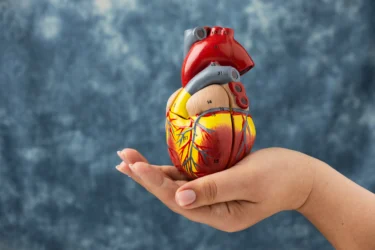Chia Seeds: Uses, Benefits, Side Effects, and More!
By Dr Smita Barode +2 more

Get,

to manage your symptom
Get your,


4 Cr+ families
benefitted

OTP sent to 9988776655



You’ve successfully subscribed to receive
doctor-approved tips on
Whatsapp

Get ready to feel your best.

Hi There,
Download the PharmEasy App now!!


Register to Avail the Offer
Send OTPBy continuing, you agree with our Privacy Policy and Terms and Conditions

Hi There,
Sign up on PharmEasy now!!
Trusted by 4 crore+ families

OTP sent to 9988776655



You have unlocked 25% off on medicines




Code: NU25
By Dr Smita Barode +2 more
Table of Contents
Chia seeds, also known as Salvia hispanica, are tiny superfoods packed with essential nutrients. They offer various health benefits. Chia seeds are rich in omega-3 fatty acids, fibre, protein, and vitamins and minerals.
From improving heart health to supporting digestion, these little seeds are a good addition to any diet. The oil extracted from them is even used in cosmetics, while other parts of the plant have been used for medicinal purposes[2]. In this blog, we’ll read about chia seeds’ benefits, side effects and uses.
Friendly Reminder: The information shared here is for educational purposes only and the reader should consult a registered medical practitioner before implementing any changes to their health routine.

Chia seeds benefit health as it contain omega-3 fatty acids[3], proteins, and fibre. They also have micronutrients like magnesium, zinc, iron, calcium, and some B vitamins. Soak them in water for the perfect, easy-to-consume texture.
Chia seeds are a superfood, but don’t be quick to snack on them alone! Although these seeds are packed with nutrients, eating them dry can be harmful. The seeds can absorb water in your digestive system and potentially cause issues, so it’s best to incorporate them into a recipe or mix them with a liquid before consuming them to reap their benefits safely.
Dr. Siddharth Gupta, B.A.M.S, M.D (Ayu)
Chia seeds might be beneficial for various conditions. However, more research is needed to determine their potential benefits for human health.

Some animal studies have shown that chia seeds may benefit type 2 diabetes. In an animal study by Chicco et al. 2009[5], chia seeds decreased the internal fatty tissue and insulin resistance, indicating that chia seeds may have a role in lipid and glucose homeostasis (maintaining balance)[7].
This information is insufficient because these studies were conducted on animals. However, more studies on humans are required to support using chia seeds to manage blood sugar levels.

Inflammatory diseases are linked with redness, pain, and swelling, which might lead to the loss of essential functions. A chia seed oil in the diet may have been shown to lower the risk of pro-inflammatory agents (involved in inflammation)[3]. Therefore, chia seed oil might benefit the management of inflammatory diseases.

High levels of high-density lipoprotein (HDL) cholesterol (bad cholesterol) in the blood may be directly linked to developing heart-related diseases in humans. Consuming chia seeds may have been shown to lower serum cholesterol levels[6], as they contain a high amount of unsaturated omega-3 fatty acids and dietary fibre[2]. Therefore, chia seeds might be beneficial in fighting heart diseases. However, extensive research will be required to back up such claims.

High blood pressure and dyslipidemia (high levels of fats or cholesterol in blood) may be the most critical risk factors for heart diseases. Some studies have shown that chia seeds may have the potential to manage blood pressure and dyslipidemia[8]. People with high blood pressure who consume chia seed flour experience reduced blood pressure[9]. It might be caused by many fatty acids that have anti-inflammatory and antioxidant properties[2].

Consuming chia seeds may benefit weight management as they are low in carbohydrates and high in dietary fibre, they may reduce the desire to eat and increase satiety (a state of being fed beyond capacity). A review report by Grancieri et al. 2019 suggests that consuming chia seeds by overweight and diabetic adults may support weight loss[3], reduce waist circumference, and increase adiponectin (a protein hormone that reduces inflammation and fat deposition in the blood). They may also be beneficial for overweight and obese individuals. However, this information is insufficient, and more research is needed to support the potential use of chia seeds in managing weight loss in humans[4].
Chia seeds can be used as:
It is essential to consult a physician before taking herbal supplements containing chia seeds. We strongly advise against replacing or discontinuing any prescribed medications with Ayurvedic or herbal products without consulting a doctor. They can guide you on the appropriate form and dosage for your needs.
Also Read: Karela (Bitter Gourd): Uses, Benefits, Side Effects and More!
Although chia seeds are relatively safe, some stomach-related side effects (unspecified) have been reported.
If you experience any side effects from chia seed, seek immediate medical attention from a doctor.
Having chia seeds in small quantities is safe. However, general precautions need to be followed.
Also Read: List of Protein Rich Food for Vegetarians
Natural products may interact with your ongoing treatment, so you must always disclose your ongoing treatments to your doctor and discuss the possible reactions before they prescribe you a dosage of natural products for their benefits as per your condition.
Also Read: 14 Amazing Health Benefits of Pumpkin Seeds!
Chia seeds are a nutritious addition to your diet, offering a variety of health benefits. They are suitable for digestion and promote heart health. They also provide a good source of protein, antioxidants, and essential minerals like calcium and magnesium, making them an excellent choice for boosting energy levels and promoting overall wellness.
Chia seeds may have many health benefits. They may suit diabetes, high blood pressure, heart-related diseases, and obesity. They may also have anti-cancer, antioxidant, and anti-inflammatory properties[2]. However, one should always consult a doctor before using chia seeds for any health conditions.
In a study by Morato et al. 2015, chia seeds reduced body weight and fat in overweight and obese people. Chia seeds are low in carbohydrates and high in dietary fibre, which might reduce the desire to eat and increase satiety. Therefore, it might benefit you in losing weight. However, more studies on humans are required to confirm this.
Chia seeds might be good for diabetes. Some animal and human studies found that chia seeds may benefit diabetes management[8]. In animals, chia seeds lowered the internal fatty tissue and insulin resistance and might be involved in maintaining a balance in lipid and glucose levels. However, this information is insufficient and requires more human studies to support this claim.
There is insufficient data on the safe usage of chia seeds during pregnancy. Therefore, consult your doctor before taking/consuming chia seeds during pregnancy.
Yes, there are various nutrients in chia seeds, including carbohydrates, proteins, fats, fibre, energy, iron, calcium, magnesium, sodium, potassium, phosphorus, copper, zinc, manganese, selenium, vitamins A, B1, B2, B3, B9, C, and E.
Yes, chia seeds might cause allergies. People who are allergic to mustard seeds and sesame should avoid chia seeds.
You can use chia seeds by first soaking them in water. They can be added to smoothies, desserts and more.
1. De Falco B, Amato M, Lanzotti V. Chia seeds products: an overview. Phytochem Rev. 2017;16(4):745–60. Available at: https://www.researchgate.net/publication/316994147_Chia_seeds_products_an_overview
2. Grancieri M, Martino HSD, Gonzalez de Mejia E. Chia Seed (Salvia hispanica L.) as a Source of Proteins and Bioactive Peptides with Health Benefits: A Review. Compr Rev Food Sci Food Saf. 2019;18(2):480–99. Available at: https://pubmed.ncbi.nlm.nih.gov/33336944/
3. Restivo J. Chia seed benefits: What you need to know [Internet]. Harvard Health; 2024 [cited 2025 Feb 4]. Available from: https://www.health.harvard.edu/nutrition/chia-seed-benefits-what-you-need-to-know
4. Ulbricht C, Chao W, Nummy K, Rusie E, Tanguay-Colucci S, Iannuzzi C, et al. Chia (Salvia hispanica): A Systematic Review by the Natural Standard Research Collaboration. Rev Recent Clin Trials. 2009;4(3):168–74. Available at: https://pubmed.ncbi.nlm.nih.gov/20028328/
5. Dietary chia seed (Salvia hispanica L.) rich in α-linolenic acid improves adiposity and normalises hypertriacylglycerolaemia and insulin resistance in dyslipaemic rats. [cited 2025 Feb 4]. Available at: https://www.cambridge.org/core/journals/british-journal-of-nutrition/article/dietary-chia-seed-salvia-hispanica-l-rich-in-linolenic-acid-improves-adiposity-and-normalises-hypertriacylglycerolaemia-and-insulin-resistance-in-dyslipaemic-rats/9B9047EBE0643F49D68AD61EF00CD02D
6. Dickens B, Sassanpour M, Bischoff EL. The effect of chia seeds on high-density lipoprotein (HDL) cholesterol. Cureus. 2023 Jun 13 [cited 2025 Feb 25]. Available from: https://pmc.ncbi.nlm.nih.gov/articles/PMC10339661/#ref-list1
7. Da Silva Marineli R, Moura CS, Moraes ÉA, Lenquiste SA, Lollo PCB, Morato PN, et al. Chia (Salvia hispanica L.) enhances HSP, PGC-1α expressions and improves glucose tolerance in diet-induced obese rats. Nutrition. 2014 Dec 20 [cited 2025 Feb 25]. Available from: https://pubmed.ncbi.nlm.nih.gov/25837222/
8. Ullah R, Nadeem M, Khalique A, Imran M, Mehmood S, Javid A, et al. Nutritional and therapeutic perspectives of Chia (Salvia hispanica L.): A review. Journal of Food Science and Technology. 2015 Oct 1 [cited 2025 Feb 25]. Available from: https://pmc.ncbi.nlm.nih.gov/articles/PMC4926888/
9. Toscano LT, Da Silva CSO, Toscano LT, De Almeida AEM, Da Cruz Santos A, Silva AS. Chia flour supplementation reduces blood pressure in hypertensive subjects. Plant Foods for Human Nutrition. 2014 Nov 18 [cited 2025 Feb 25]. Available from: https://pubmed.ncbi.nlm.nih.gov/25403867/
10. Chia seed (Salvia hispanica L.) supplementation to the diet of adults with type 2 diabetes improved systolic blood pressure: A randomized controlled trial. Available from: https://pubmed.ncbi.nlm.nih.gov/33530854/
Disclaimer: The information provided here is for educational/awareness purposes only and is not intended to be a substitute for medical treatment by a healthcare professional and should not be relied upon to diagnose or treat any medical condition. The reader should consult a registered medical practitioner to determine the appropriateness of the information and before consuming any medication. PharmEasy does not provide any guarantee or warranty (express or implied) regarding the accuracy, adequacy, completeness, legality, reliability, or usefulness of the information; and disclaims any liability arising thereof.
Comments

Leave your comment...
You may also like
Comments